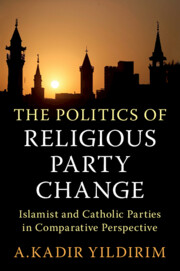Book contents
- The Politics of Religious Party Change
- Cambridge Studies in Social Theory, Religion, and Politics
- The Politics of Religious Party Change
- Copyright page
- Contents
- List of Figures
- List of Tables
- Acknowledgments
- Introduction
- 1 Explaining Religious Party Change
- 2 Catholic and Islamic Religious Institutions
- 3 Anticlericalism, Religious Revival, and the Rise of Religious Political Identities
- 4 The Origins of Religiopolitical Identity
- 5 Intraparty Conflict
- Conclusion
- Bibliography
- List of Interviews
- Index
5 - Intraparty Conflict
Published online by Cambridge University Press: 22 December 2022
- The Politics of Religious Party Change
- Cambridge Studies in Social Theory, Religion, and Politics
- The Politics of Religious Party Change
- Copyright page
- Contents
- List of Figures
- List of Tables
- Acknowledgments
- Introduction
- 1 Explaining Religious Party Change
- 2 Catholic and Islamic Religious Institutions
- 3 Anticlericalism, Religious Revival, and the Rise of Religious Political Identities
- 4 The Origins of Religiopolitical Identity
- 5 Intraparty Conflict
- Conclusion
- Bibliography
- List of Interviews
- Index
Summary
This chapter analyzes how the distinctive institutional environments and their corollary ramifications on religious authority drive religious movements to adopt different strategies in shaping their political activism and creating religious parties, focusing on religious competition and conflict. Islamist movements, unperturbed by a hierarchical religious authority, found the liberty to pursue hybrid organizational structures. This carte blanche to assume religious authority enabled Islamist movements to operate both as a religious movement that serves in religious, social, and educational areas and as a religious party in the political arena. The Church hierarchy, by contrast, forced Catholic mass movement leaders to choose between expulsion and avoiding political activism in the name of Catholicism. Catholic political activists largely responded to this challenge by formally parting ways with mass movements and creating their own Catholic parties without the Church's blessing, ultimately deprived of the ability to rely on religious authority in their political ventures. In addition, this chapter focuses on the implications of distinct organizational trajectories on the electorate.
Keywords
- Type
- Chapter
- Information
- The Politics of Religious Party ChangeIslamist and Catholic Parties in Comparative Perspective, pp. 190 - 260Publisher: Cambridge University PressPrint publication year: 2023

